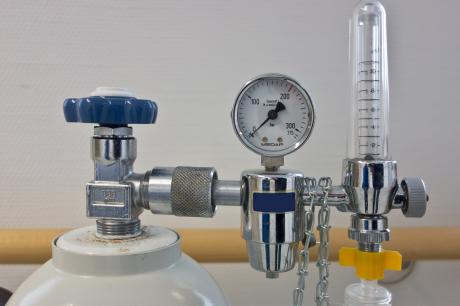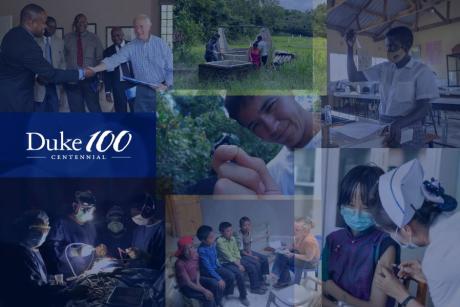
Beautiful view from the Serena Hotel. During my first week in Uganda this is where I stayed with the rest of the Duke team.
Published September 2, 2014, last updated on October 5, 2017 under Voices of DGHI
By Tony Fuller
MSc-GH student
Week 1: August 17-23
Stepping off the plane, immediately I took a deep breath and looked around. As that breath travelled deep into my lungs, I was overcome with a sense of joy. This would be my new home for the next few months. Somehow I was able to stave off the grasp of jet-lag, so standing in line for customs was actually enjoyable. Customs is always an enjoyable experience as that added stamp to my passport provides a sense of accomplishment. After a brief conversation with the lady at the desk about why I was staying in Uganda so long, it was time to grab my bags and head to Kampala. Dr. Haglund, my Duke mentor for my time in Uganda, along with a team of about 18 other people joined me around baggage claim and we walked outside. Off in the distance I could see fluorescent light beaming from the huge advertisement screen, cutting through the darkness of the night. Illuminated by this light were the welcoming faces that I encountered last time I made this trip. Along with this group of people was my close friend and classmate: Tu Tran. He had been in Uganda for about three months working on our joint project so it was great to see him.
After getting to the Serena hotel around 2 am, I laid down and rested as I knew the next few days/weeks would be jam-packed. To say that I was busy my first week in Uganda would be an understatement. Tu, my partner in our endeavor to quantify the surgical burden in Uganda, was scheduled to depart just two days after my arrival. What this meant was that he had to catch me up on the last three months of work. Although we talked over Skype and email, there’s so many on the ground things that can’t be communicated till you arrive. Our first day together consisted of discussing all the ins and outs of how the project was being run, meeting people, and showing me around to the places that I would need to know when he left. Information was flying at me left and right and I did my best to grasp as much as I could. Luckily Tu and I have known each other for a while so he knew the key points to hit on. The following day we had a team meeting with all of the field supervisors for our project and then just like that Tu was on his flight back. This left me essentially at the helm with the official data collection start date looming over me. With the final days left in the week I tried my best to keep the study on track and dealt with the small emergencies that popped up. I went into this weekend with all the teams on the ground collecting data.
At this point I have yet to fully discuss what I will be doing in Uganda, so let me take this time to briefly touch upon this topic. As I have alluded to earlier the main thing I will be doing in the first part of my time in Uganda is helping Tu. Tu and I have been working together with Dr. Haglund since before we both joined the MSc-GH last year. As both of us, along with Dr. Haglund, have vested interests in surgery (Tu as something he might do in the future, and me wanting to become a neurosurgeon) ideally we wanted a project that would allow us to explore this interest. We found the perfect project in the Surgeons Overseas Survey (SOSAS) of surgical conditions. After researching and talking to the people who performed the SOSAS survey in Sierra Leone and Nepal, we adapted the project to Uganda. This survey is meant to assess the burden of surgical conditions within a country, similar to the Global Burden of Disease study, but focused solely on surgery. Results from this survey are then meant to be used by the Ministry of Health to aid them in helping to fill in the gaps where there is the most need.
Obvious to both Tu and myself, something this big needed a team of people to help which is why we spent a considerable amount of time putting together a great team around us with the help of Dr. Haglund. We have over 140 people helping with this project, with about 121 who are fields supervisors and enumerators that are working on the ground collecting the data. My role is mainly supervisory in nature making sure that everything goes smoothly, people have what they need, and doing anything else to help the study move forward. Although I could continue to talk about this project and all the amazing people that are helping with this project, I will save that for another post.
In addition to the surgical burden study I will be spending my time working on my own project, which is the title of this blog. My study is focused on quantifying the outcomes of all neurosurgery patients that have been operated on by Ugandan physicians following the establishment of the twinning program with Duke. Briefly this twinning program consisted of a multi-faceted approach. One of the major drivers being the human capital from both the Mulago Hospital side (national reference hospital in Uganda) and the Duke side. Each team consists of doctors, nurses, OR nurses, ICU staff, IT personnel, students, and medical equipment management staff that are “twinned” with someone from Mulago that performs similar duties. Aiding in this endeavor is a large amount of surgical equipment that has been donated for use at Mulago. Teams come at least once a year and run week-long camps where knowledge and best practices are exchanged. Already this project has shown a large increase in the number of people being treated for neurosurgical conditions, from around 56 cases to more than 550 cases this past year. Impact from this project is hard to argue with. My study is meant to focus on how well the patients are doing now to add additional evidence to support this model. Alongside of this I will be working in the neurosurgery ward at Mulago and working on various other projects that I will discuss in the future. My time in Uganda is thus very ambitious, but if my first week’s experience is any indication the people around me will aid me in achieving my goals.


